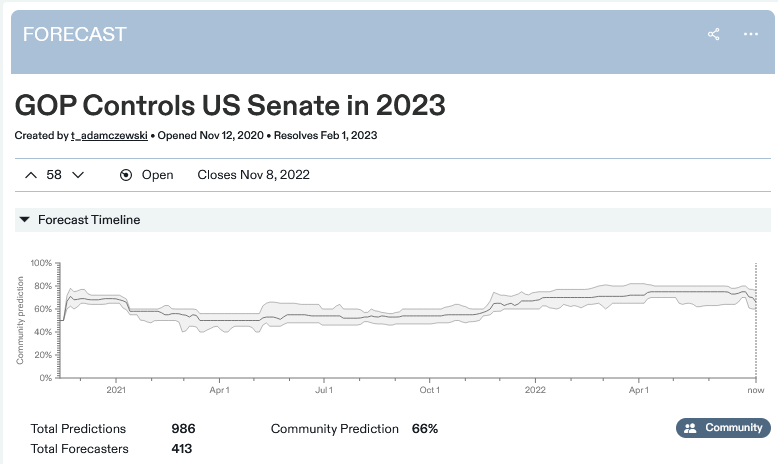Mantic Monday 7/11/22
Curtains For Trump?
The original case for formal forecasting grew out of pundits often being confident and wrong. And nowhere have pundits been wrong more often than when they predict that the newest scandal will end Donald Trump’s career once and for all.
 Source: KnowYourMeme
Source: KnowYourMeme
I thought of this last week while reading Is Conservative Media Breaking Up With Trump? The Daily Beast argues that the revelations from the 1/6 Committee are so damaging that even previously-loyal GOP elites are starting to turn on their former master. And with DeSantis as such a tempting alternative 2024 nominee, maybe Trump is more of a liability than an asset. Is this finally the jam ol Donny Trump can’t wriggle his way out of?
No. Absolutely not. PredictIt’s estimate of Trump’s chance of winning the 2024 GOP nomination is higher than ever. Ah well. Nevertheless.
| The immediate cause of the July 1 spike could have been this New York Times article, saying Trump was getting close to announcing his candidacy. So you could make an argument that the decline from 6/19 to 6/29 was a genuine effect of damaging insurrection revelations, and then the spike around 7/1 was an unrelated boost from people increasing their probability that he would run. If true, that suggests that P(Trump wins | Trump runs) is pretty high, since even small revelations about his intentions move the market a lot. |
There is (inexplicably) no PredictIt market on whether Trump will run, but the relevant Metaculus question is at 82% (and didn’t rise much with the NYT article). If the NYT article caused the big spike in Trump predictions on PredictIt, something is wrong either with their market or with this one.
Related: Liz Cheney says the Republican Party “can’t survive” nominating Trump in 2024. This is exactly the kind of prediction I anticipate people walking back if they were asked to make it formally. Let’s say “conditional on Trump as 2024 nominee, Republicans won’t get >40% of the vote in either of the 2028 or 2032 presidential elections”. Would Liz Cheney - or anyone else - really take that bet, at any odds? Is there any formulation matching a commonsense notion of “not surviving” they would accept?
Swift Centre Veterans For Truth
Half of the promise of prediction markets and tournaments is using “the wisdom of crowds” to aggregate forecasts effectively. But the other half of their promise is that markets and tournaments reveal talent. We all know Berkshire Hathaway has good investors and the Golden State Warriors have good basketball players. Maybe we can identify teams of superstar forecasters (forecastars?) and make them available for people who need their services.
The first group like this to catch my attention was Samotsvety, who describe themselves as “a group of forecasters with a great track record working on applying forecasting to impactful questions”; they released a nuclear risk forecast in March which sparked some good debate.
In February, crypto tycoon Sam Bankman-Fried donated $1 billion to the Future Fund, a rationalist-adjacent organization that kickstarts projects promoting the long-term future of humanity. When they couldn’t spend their money fast enough, they deputized friendly experts as “regrantors”, charged with the task of going out and spending their money to start organizations that should exist but don’t. One regrantor must have thought that good forecasting teams were in this category, because it looks like Future Fund spent $2 million making this happen. The result is the Swift Centre For Applied Forecasting in London. They describe themselves as:
The Swift Centre will publish forecasts from a panel of highly experienced and accurate forecasters including Good Judgment Project Superforecasters and financial industry professionals, collated and explained to help you navigate the world.
So far they have two reports, one on monkeypox and one on Ukraine. I’ll try to review this in more detail some other Monday.
Curtains For Musk?
Last week, Elon Musk announced he was withdrawing his offer to buy Twitter. His excuse was too many spambots, but nobody takes this seriously and it isn’t legally valid (see Matt Levine for more). Twitter has promised to sue to make the deal go through. What are their chances?
The most useful market I can find here is Polymarket’s question on Twitter getting removed from NYSE (a natural consequence of Musk taking it private):
23% by December 30, but probably a trial would drag on long past then, so I don’t think that’s the final chance.
Metaculus lists the chance of Elon Musk becoming CEO of Twitter by 2025 as 10%.
I don’t know how to square this with Polymarket, unless they think that Twitter might get delisted for other, non-Musk-related reasons.
A Dobbs Mystery
Democrats are angry about the overturning of Roe. Republicans are happy, but angry people vote and happy people mostly don’t. So plausibly the decision increases Democrats’ chance of keeping the Senate later this year:
 Source: PredictIt
Source: PredictIt
PredictIt shows Democrats’ chances increasing by about 5% in May when someone leaked the draft opinion, then about 15% in June when the decision was announced.
This is a weird pattern, isn’t it? If the Roe reversal really improved Democrats’ chances by 15%, why did it take until the reversal happened for people to update? Why not update as soon as the draft came out? Sure, things could have changed between the draft and the decision. But taken seriously, this implies that a memo by the Supreme Court Justices saying “we are reversing Roe” only implied a 33% chance they would really do it. But we saw earlier that the prediction markets were saying there was a 95% chance they would! So why the big update when it happened?
Metaculus is hard to read on this question - they really should make it easier to zoom in on their graphs, or at least give specific dates - but it looks like they show the same pattern:
One possibility is that PredictIt and Metaculus forecasters are dumb. Maybe people who hadn’t used these sites in ages hear the news about Dobbs, think “this will probably harm the Republicans’ chances in November!”, and rush to the prediction markets without thinking very hard about how Bayesian updating works.
(ironically, this might have been the right move: the Democrats’ chances did go up, so the first person to try this could sell for a profit a few days later)
Or maybe it was something else that happened around the same time. On June 30, Nate Silver published his forecast Why The Republicans Are Favored To Win The House, But Not The Senate. Before that, conventional wisdom had thought Republicans were definitely favored to win the Senate (see above, PredictIt was ~75% on this). Silver said the right probability was more like 53%. If Silver’s right, even now the markets are overestimating the GOP.
This would be a perfect explanation except that on the PredictIt chart the move clearly happened before 6/30 - the biggest daily change was 6/29. Maybe people were just dumb.
Morecasting
1:Ensemble models of COVID forecasts: if you aggregate a bunch of COVID forecasts to try to tap the “wisdom of crowds”, do they do better than individual forecasts? If you do a good enough job aggregating, then yes - this paper finds their “ensemble” outperformed 84-92% of individual models (h/t Nikos Bosse).
2: The race to replace Boris Johnson (source: this British betting site)
3: In my last links post, I talked about the East African Federation, a proposed merger of seven African countries. Now there’s a Metaculus question on it (though it’s too early to have any results available).




